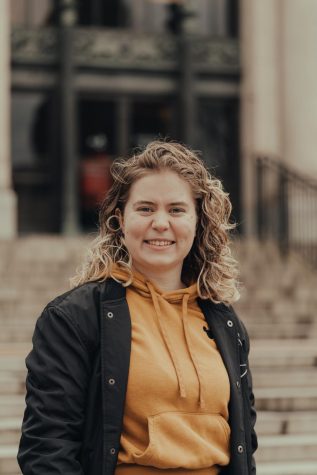Oregon expected to have hotter than average summer temperatures
July 24, 2021
August temperatures are expected to be hotter than normal this year, but the Willamette Valley is unlikely to experience a heat wave of large magnitude during the late summer.
The last weekend of June brought historically high temperatures as an abnormal heat wave swept through many parts of the Pacific Northwest, bringing with it record high temperatures. Portland, Ore. reportedly reached a high of 116 degrees Fahrenheit over the weekend whereas Corvallis, Ore. reached a high of 110 F.
This heat wave, which was unusual for the Willamette Valley’s typically cooler and wetter climate, was caused by high pressure.
“The heat wave was caused by an extensive high-pressure system, often referenced as a heat dome. This particular heat dome was extraordinarily strong,” said Erica Fleishman, director of the Oregon Climate Change Research Institute and professor at Oregon State University in the College of Earth, Ocean and Atmospheric Sciences. “The atmospheric effects of tropical storms in the Pacific may have [also] contributed to the extreme heat.”
Larry O’Neill, an associate professor at OSU in the College of Earth, Ocean and Atmospheric Sciences and the state climatologist for Oregon, said this heat dome that created a high-pressure system created the conditions for hot air to sink to the surface. This happens normally during heat waves, but this heat wave was worse than normal because it was much more intense.
“Right now, no one has a well-justified explanation for why it was so intense,” O’Neill said. “For sure climate change played a role in it, partly just due to the fact that we’re slowly warming up our climate so our baseline temperatures are increasing, so that can make heat waves more intense.”
Despite this heat wave happening so early into the summer when August tends to be the warmest month in the Willamette Valley, there is no current expectation for another heat wave of the same magnitude to occur this year, according to climate experts.
“We wouldn’t expect there to be another one, but with the changing climate, we’re starting to see things that we don’t expect,” O’Neill said. “The heat wave that we just went through probably was not a one-off event. It’s probably something we’ll experience more often with similar intensities—maybe more—and higher frequencies.”
However, while temperatures aren’t expected to go over 100 F again this summer in the Willamette Valley, residents should expect a summer that is hotter than normal, especially in the months of August and September.
“The National Weather Service is predicting a roughly 40% to 60% probability that temperatures in Oregon during the next several months will be higher than the most recent 30-year average for the same time period,” Fleishman said.
She also added that other additional heat waves, though not expected to be far above 100 F, would not be surprising.
These heat waves are especially concerning because of how they can affect certain members of the community.
“It becomes so uncomfortably hot that you can’t sleep, so people don’t sleep very well those nights, and when people don’t sleep well, it can exacerbate health conditions,” O’Neill said. “It’s more than just being tired the next day. Some people—it might give them a heart attack. If they’re having a heat stroke or heat exhaustion or something like that, there’s no recovery and so it’ll make their heat illness worse.”
However, these heat waves also do not affect everyone equally, especially along racial and economic lines.
“For example, agricultural workers, many of whom are undocumented, often have much greater exposure to heat and less access to healthcare than affluent populations,” Fleishman said. “Members of historically and currently underserved communities are more likely to experience negative health effects of heat waves and other climate extremes.”
During the most recent heat wave at the end of June, the City of Corvallis worked with Benton County and area social providers to open a cooling center at the Corvallis Community Center on June 26 and 27.
“The city saw about 10 to 15 people take advantage of the cooling center each day, so [it was] not a large number of people,” Corvallis City Manager Mark Shepard said via email. “The [Corvallis] Daytime Drop-in Center (not-for-profit social service provider to the homeless) also opened as a cooling center for houseless individuals in the community.”
These cooling centers were not widely used by members of the community but will be made available again if needed. Shepard said the city will open the cooling centers again if the Benton County Health Department determines that they are essential.
If Corvallis citizens want to know of a cooling center’s availability, there are multiple avenues through which the city releases information on it.
“In the last event, the city provided the information on the city’s web page, and we pushed the information out through our social media channels,” Shepard said. “We [also] coordinated with Benton County who issued a press release.”
To cope with future heat waves, O’Neill gave several possible tips including having lots of fans, going to movie theaters, not exercising or doing yard work, not being in the direct sun, not driving around during the hottest parts of the day, closing the house up early in the morning and covering windows.
“The really important thing is that anyone who is able [to] should try to check on their family members, children and neighbors, and just check in on them and see what their conditions are,” O’Neill said. “A community level response is going to be very important for these conditions and these extreme events. People [should] look out for each other—that’s the most important thing you can do.”











































































































